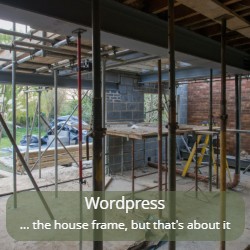At its core, what actually is WordPress? In WordPress Architecture Explained, we look at all that is require to take the basic WordPress content management system and turn it into a living, breathing and fully functioning website.
What Is WordPress?
 WordPress is, quite simply, a website content management system.
WordPress is, quite simply, a website content management system.
It is the basic shell which is the start of building a website.
However, if you just have WordPress, you will not have a website that functions as you expect a website to function.
Imagine you are building a new house. If you have started your project and have just the frame of the house up, but nothing else, so no windows, no roof, no doors, plumbing or electricity, you wouldn’t want to live in it as it would be completely unfinished.
This is what WordPress is like before you add any of the features below to it – it is a website, but you wouldn’t want anyone to see it!
WordPress Website Themes
Once you have your basic WordPress frame, to make it look more like a website, and to alter the layouts, the colours and typography styles (fonts), you need a Theme.
Back to our house analogy, the Theme is the rendering of the outside of the house, the plastering of the inside of the house and the roof to keep it all dry.
Some themes operate completely on their own, others required what are called Child Themes to apply the finishing touches.
Studio Press is a company that builds a widely acclaimed main theme called Genesis, but to make Genesis work properly, you also need a Child Theme to go along with it.
It is like the parent theme, Genesis, is the roof and the walls, but the Child Theme (Outlook Pro is one of the more popular ones) is required to choose the colour of the windows, the rendering and internal plastering.
Generatepress is a WordPress Theme which does not require a child theme to operate.
Once you have WordPress and your Theme installed (with or without child theme, depending on requirements), are you ready to go live with your website?
Not quite, you need some plugins!
WordPress Plugins
Your WordPress Plugins are your finishing touches.
Your house is now going to have electrics installed, plumbing finished, bathrooms and kitchens chosen and everything else needed to complete it.
WordPress Plugins are additional tools from other companies (mostly free of charge) that allow your website to fully function.
They include plugins for:
- Contact form plugins – so that visitors can easily send an enquiry about your services to you. Contact Form 7 is our favourite.
- Security plugins – to stop people hacking your WordPress website.
- SEO Plugins – these help you to ensure that your content pleases Google and other search engines. Yoast and Rank Math are two of the most common ones.
- GDPR Cookie Consent plugins – to ensure you comply with all of your data protection obligations.
- Testimonial Plugins – so you can add scrolling boxes of client reviews.
- Site Speed Plugins – as the speed of your site becomes more and more important, plugins that speed it up, like WP-Rocket, become vital.
Plugins are those ‘all important finishing touches’ that make your house a home, or your WordPress shell a complete, ready to go website.
So, do you need anything else?
No.
Do website companies use anything else?
Yes.
WordPress Page Builders
Before WordPress, websites were built by hand, and if they were built well, they used CSS (cascading style sheets) which told the page how to present it.
If you wanted a two column website, you coded this in the CSS so that the page knew how to load.
Three column layout – put it in the CSS.
On each page, it would link to the CSS telling it how to present itself, the big advantage of this being that the page didn’t have to have the entire styling laid out on it, it could just quickly pull this in from the central CSS code.
The huge benefit of this is that it stopped the page being full of additional, unnecessary coding that clog up the page and make it incredibly slow to load.
This is a huge negative for Google, as a slow website is going to be pushed further and further down the Search Engine results (more and more each time with the latest Google Algorithm updates – ie how it decides which websites get to the top of Google and which do not).
So, on to page builders.
Whilst most traditionally trained website designers learned to code using Cascading Style Sheets, the fact that WordPress is so easy to use bought along a new block of website developers who wanted to offer website design services, but didn’t know how to code a website from scratch.
Cue Page Builders.
Page builders for WordPress, like Divi Builder, Elementor and WP Bakery allow a website developer to build a website without any website coding knowledge (CSS), but they have two major problems:
- They add the vast amounts of unneccessary code to every page, making them slow to load (remember, slow is bad, very bad); and
- They make the editing of each page very hard and time consuming.
Seeing as the entire point of a WordPress website is to create a simple, easy to edit website, this is a major problem.
A well designed, well built website should make it as easy as a Microsoft Word document or Apple Pages document to edit. You should be able to access the page, change the words you want to change in one, simple block of content, press Update and away you go.
When a Page Builder is used, that content is now in possibly as many as 15 to 20 different boxes.
Suddenly to change one page takes 10 times as long as it would do if your WordPress website had been built without a page builder.
Now imagine if you do your job well and in time your website grows to 100 pages, 200 pages or 500 pages.
Imagine editing 15 to 20 blocks on 500 pages, that is now 7,500 to 10,000 blocks of content to edit instead of 500 blocks of content.
How much longer will that take you?
And remember, those 500 pages are now loading slowly because on each of those pages all of the code required to tell the page how to display itself is on that page instead of in a CSS file, separate from each page.
You can probably see now why we are not fans of page builders and why we strongly suggest you use a website design company that does not use them to build your site.
Back to our building a home analogy, page builders are like building your lovely new home, then filling every room with furniture, to such an extent that you can still use your home, it is just very much slower to get around it, and you keep bumping into things. It takes so much longer to get around and use your house than it should, just like Page Builders with WordPress.
They are simply not necessary to build your beautiful new home/Wordpress Website.
